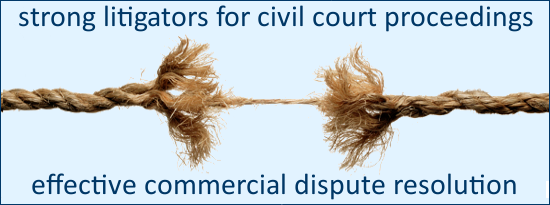Litigation: Arbitration: Dispute Resolution
Solicitors acting in commercial disputes
Our commercial litigation solicitors actively pursue all avenues of dispute resolution available (court proceedings, arbitration, mediation, any other way of trying to cut a decent deal), advising clients on the method and place most appropriate to their particular case.
If disputes are not settled by negotiation, and if not abandoned, they will be fought out in court litigation or some other form of dispute resolution. The most common other methods are arbitration & mediation.
Good litigators understand how best to manoeuvre dispute resolution within the system, while developing winning case strategies.
Disputes are increasingly global.
London is a key forum for international litigation and arbitration.
London is often the preferred seat of arbitration.
Litigation: court proceedings
High Court litigation remains the main method by which parties seek to resolve large commercial disputes in England & Wales.
Litigation involves the opposing parties seeking to prove their case on the balance of probabilities before, in the majority of cases, a judge. This means that the court must assess the oral, documentary and real evidence produced by each party to decide which occurrence of the event is more likely than not.
Litigation procedure is governed by the Civil Procedure Rules (CPR). However, parties must be aware that some courts have their own specific rules that apply to specific circumstances.
Before commencing proceedings, the court expects the parties to have complied with any relevant pre-action protocol. The court expects the parties to have exchanged sufficient information to identify, narrow and try to settle the issues between them.
Arbitration: private forum by agreement
Large commercial disputes may also be dealt with through arbitration. This is a less formal and confidential process whereby disputes are resolved by a final and binding award made by one or more independent arbitrators.
Mediation: outside the court process
The court also expects alternative dispute resolution, such as mediation, to have been considered and in many cases attempted.
The pre-action stage: before claim
- limitation periods (whether the statutory period within which the claim must be brought has expired)
- solvency of the defendant (it is not worth pursuing litigation against a party known to be on the verge of being wound-up or being made bankrupt)
- methods of funding the litigation such as no win no fee agreements
- consideration of available methods of arbitration, mediation or alternative dispute resolution
- in court proceedings, compliance with the Practice Direction on Pre-Action Conduct and any relevant protocols (which set out the procedure that parties to litigation must follow).
The most important step for a claimant is issuing a compelling letter before claim, which sets out the nature of the case against the defendant and may prompt early settlement by providing information early on in the dispute. For a defendant, the most important step is the sending of a full letter of rebuttal.
Mechanics of conducting proceedings
- Work and so costs are driven by procedural rules & the timetable of the courts.
- The volume of hard copy paperwork needing to be read, absorbed & relied on or attacked means that time has to be spent sifting through documents, scheduling & copying them to provide the court and all other parties with agreed bundles of case papers.
What do litigation (arbitration) lawyers do?
- Advise clients on whether they have a valid claim, or whether to settle or fight a claim made against them.
- Gather evidence & witnesses to support the client’s position; develop case strategies.
- Issue or be served with court proceedings or try a process of alternative dispute resolution if correspondence with the other side does not produce a satisfactory result.
- Represent clients at pre-trial hearings & case management conferences.
- Attend (on person or by phone or Skype) conferences with counsel (barristers) and brief them to conduct advocacy in hearings, trials & arbitrations.
- Attend trials, arbitrations & mediations with clients and work with specialist barristers.







